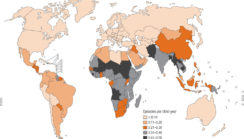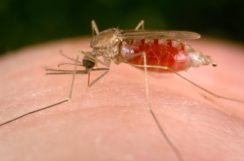Respiratory Diseases in India (Pneumonia and Tuberculosis)
Image: Incidence of childhood clinical pneumonia at the country level from WHO
This page is part of Pediatric Infectious Diseases in India post
I will limit this discussion to pneumonia and tuberculosis (which isn’t solely respiratory) for the sake of brevity.
PNEUMONIA
Pneumonia is the leading global killer of children under five, responsible for almost 1.6 million deaths per year. In that vulnerable population, it is a disease of poverty and occurs most commonly when a child’s still-developing defense system is weakened by malnutrition, air pollution, co-infections with HIV/AIDS and measles, and low birthweight, with 43 million cases for children in India alone.
- Pneumonia is the leading cause of death in children worldwide.
- Pneumonia kills an estimated 1.2 million children under the age of five years every year – more than AIDS, malaria and tuberculosis combined.
- Pneumonia can be caused by viruses, bacteria or fungi.
- Pneumonia can be prevented by immunization, adequate nutrition and by addressing environmental factors.
- Pneumonia caused by bacteria can be treated with antibiotics, but around 30% of children with pneumonia receive the antibiotics they need. (source)
Pneumonia occurs when the sacs of the lungs, known as alveoli, become filled with pus and fluid, limiting oxygen intake and making it hard to breathe.










Childhood Vaccines in India, Part 1
Part 1: How vaccines are made and how they work
In 2008, WHO estimated that 1.5 million of deaths among children under 5 years were due to diseases that could have been prevented by routine vaccination. This represents 17% of global total mortality in children under 5 years of age.
Hygiene, proper nourishment and sanitary conditions make for a healthy community, with lowered incidence of infectious disease, but since much of this is lacking in developing countries, vaccination is very helpful to giving the immune system a boost.
We can thank scientists, physicians and engineers for their work in understanding the immune system and how to make it work for us against disease by using vaccinations.
More
11 years ago Blog, Health, Science, STEM, Travel • Tags: attenuated vaccine, child survival, diphtheria, effective vaccines, hepatitis, inactivated vaccine, India, International Reporting Project, pertussis, Polio, STEM, tetanus, The History of Vaccines, typhus, vaccine types, vaccines, WHO